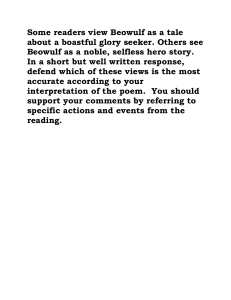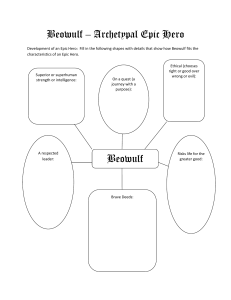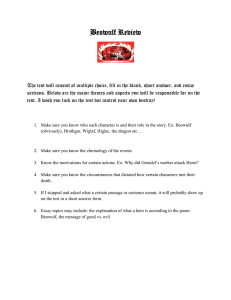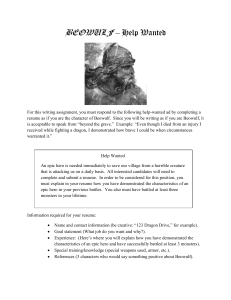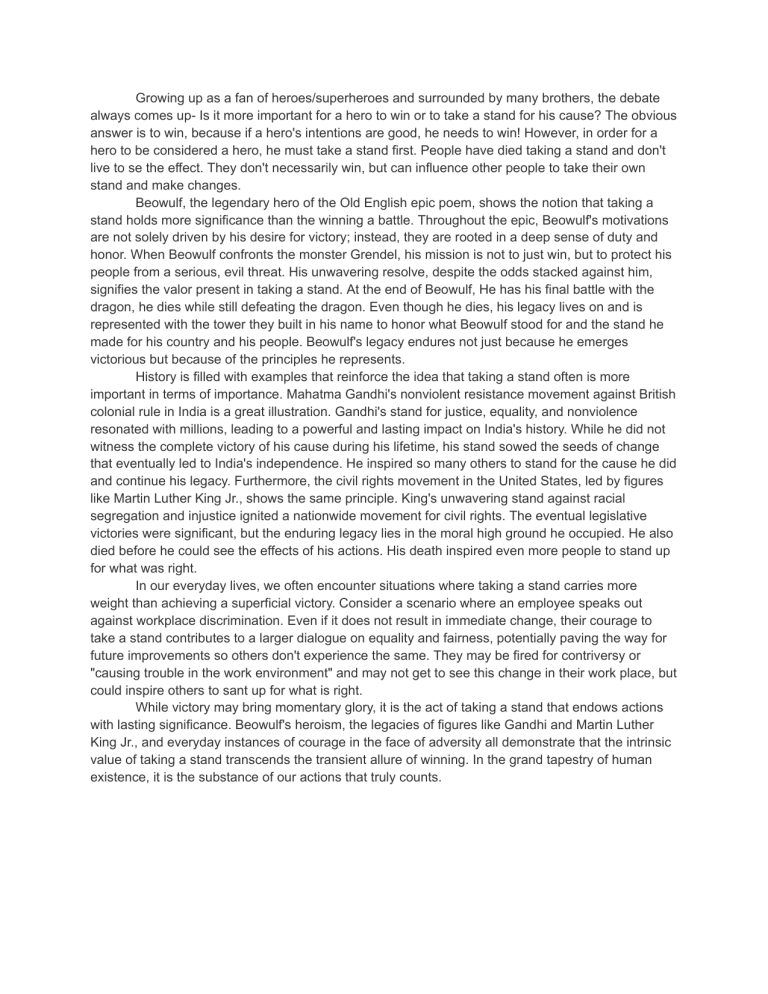
Growing up as a fan of heroes/superheroes and surrounded by many brothers, the debate always comes up- Is it more important for a hero to win or to take a stand for his cause? The obvious answer is to win, because if a hero's intentions are good, he needs to win! However, in order for a hero to be considered a hero, he must take a stand first. People have died taking a stand and don't live to se the effect. They don't necessarily win, but can influence other people to take their own stand and make changes. Beowulf, the legendary hero of the Old English epic poem, shows the notion that taking a stand holds more significance than the winning a battle. Throughout the epic, Beowulf's motivations are not solely driven by his desire for victory; instead, they are rooted in a deep sense of duty and honor. When Beowulf confronts the monster Grendel, his mission is not to just win, but to protect his people from a serious, evil threat. His unwavering resolve, despite the odds stacked against him, signifies the valor present in taking a stand. At the end of Beowulf, He has his final battle with the dragon, he dies while still defeating the dragon. Even though he dies, his legacy lives on and is represented with the tower they built in his name to honor what Beowulf stood for and the stand he made for his country and his people. Beowulf's legacy endures not just because he emerges victorious but because of the principles he represents. History is filled with examples that reinforce the idea that taking a stand often is more important in terms of importance. Mahatma Gandhi's nonviolent resistance movement against British colonial rule in India is a great illustration. Gandhi's stand for justice, equality, and nonviolence resonated with millions, leading to a powerful and lasting impact on India's history. While he did not witness the complete victory of his cause during his lifetime, his stand sowed the seeds of change that eventually led to India's independence. He inspired so many others to stand for the cause he did and continue his legacy. Furthermore, the civil rights movement in the United States, led by figures like Martin Luther King Jr., shows the same principle. King's unwavering stand against racial segregation and injustice ignited a nationwide movement for civil rights. The eventual legislative victories were significant, but the enduring legacy lies in the moral high ground he occupied. He also died before he could see the effects of his actions. His death inspired even more people to stand up for what was right. In our everyday lives, we often encounter situations where taking a stand carries more weight than achieving a superficial victory. Consider a scenario where an employee speaks out against workplace discrimination. Even if it does not result in immediate change, their courage to take a stand contributes to a larger dialogue on equality and fairness, potentially paving the way for future improvements so others don't experience the same. They may be fired for contriversy or "causing trouble in the work environment" and may not get to see this change in their work place, but could inspire others to sant up for what is right. While victory may bring momentary glory, it is the act of taking a stand that endows actions with lasting significance. Beowulf's heroism, the legacies of figures like Gandhi and Martin Luther King Jr., and everyday instances of courage in the face of adversity all demonstrate that the intrinsic value of taking a stand transcends the transient allure of winning. In the grand tapestry of human existence, it is the substance of our actions that truly counts.
